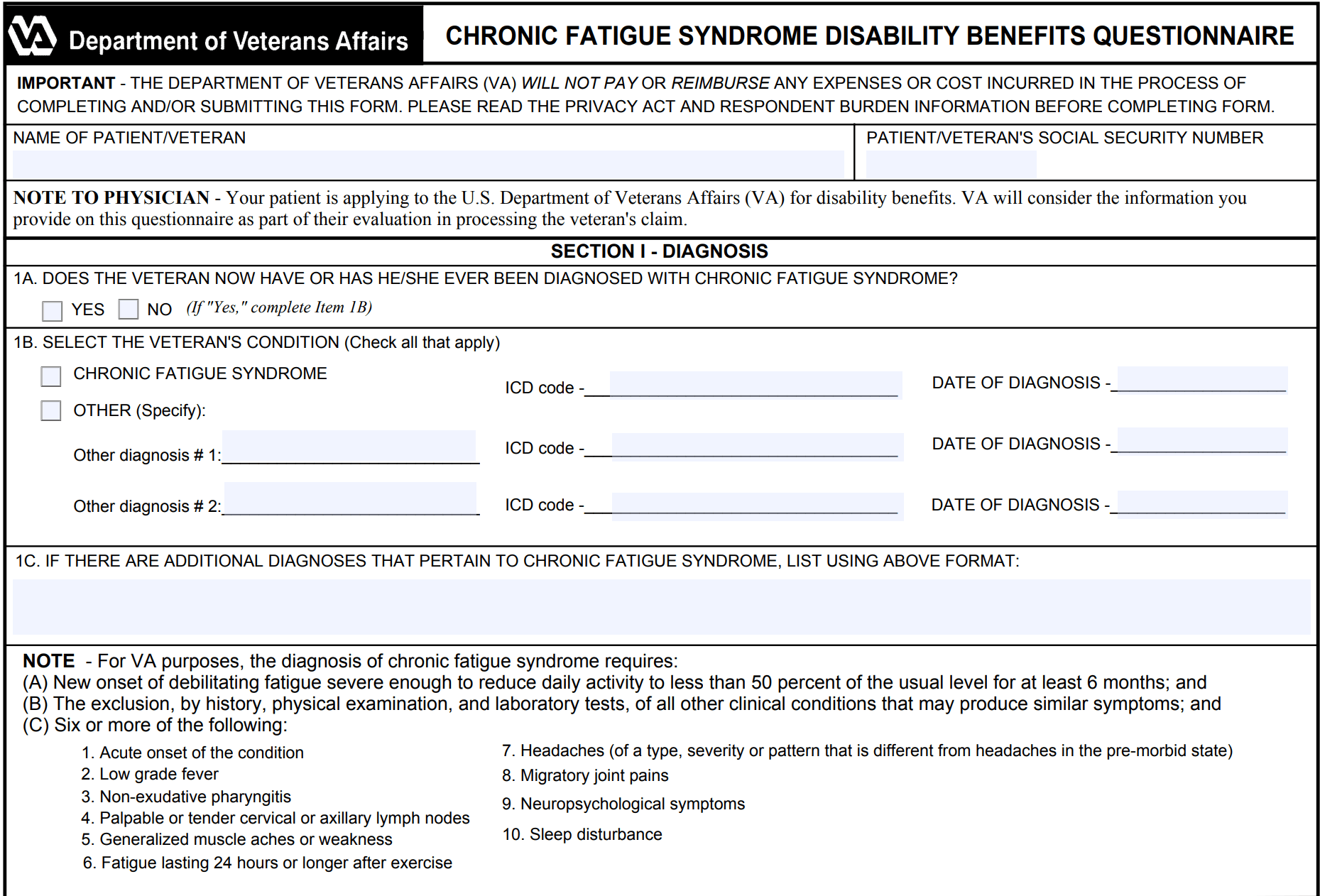In this post, we will be exploring the Chronic Fatigue Syndrome VA Rating criteria in detail.
In 2020, the VA disability ratings for Chronic Fatigue Syndrome are 10%, 20%, 40%, 60%, and 100%, and depend upon the frequency, severity, and duration of a veteran’s symptoms.
This means the more severe your symptoms, the higher the VA rating for Chronic Fatigue Syndrome.
The highest possible VA disability rating for Chronic Fatigue Syndrome is 100 percent.
So, let’s take a minute to explore the law regarding the symptoms and impairment required to warrant a VA disability rating for Chronic Fatigue Syndrome.
Many veterans, especially Gulf War Veterans, suffer from a variety of unexplained medical conditions to include Chronic Fatigue Syndrome.
Chronic Fatigue Syndrome VA Rating: What is Chronic Fatigue Syndrome?
Chronic Fatigue Syndrome is a complex disorder characterized by extreme fatigue in veteran’s that can’t be explained by any specific medical condition.
A veteran’s level of fatigue may worsen with physical or mental activity but doesn’t improve with rest.
According to the Mayo Clinic, Chronic Fatigue Syndrome is a systemic exertion intolerance disease (SEID) or myalgic encephalomyelitis (ME).
Sometimes it’s abbreviated as ME/CFS for VA rating purposes.
The etiology (cause or origin) of Chronic Fatigue Syndrome is unknown, although there are many theories — ranging from viral infections to psychological stress to exposure of toxins and chemicals.
One thing we do know is that veterans who served in Southwest Asia theater of operations are more prone to developing Chronic Fatigue Syndrome, although researchers don’t exactly know why.
A 2005 study confirmed that veterans who deployed to the Persian Gulf during the 1991 Gulf War have an increased risk for Fibromyalgia, Chronic Fatigue Syndrome, Skin Conditions, and Dyspepsia.
There’s no single test to confirm a diagnosis of Chronic Fatigue Syndrome.
You may need a variety of medical tests (to include a blood test and lab work) to rule out other health problems and conditions that have similar symptoms to Chronic Fatigue Syndrome.
Some of the other possible medical conditions that should be ruled out by a medical professional include:

- Sleep Disorders. Your chronic fatigue may be due to an underlying sleep disorder. A sleep study can determine if your rest is being disturbed by disorders such as obstructive sleep apnea, restless legs syndrome, or insomnia. Ask your VA primary care doctor for a referral to a sleep specialist if you think you may have a sleep disorder.
- Other Medical Problems. Fatigue is a common symptom in several medical conditions, such as anemia, diabetes, and hypothyroidism. Typically, a blood test can help confirm or rule out these conditions. Note that a blood test CANNOT diagnose Chronic Fatigue Syndrome.
- Heart and Lung Issues. Problems with your heart or lungs can make you feel more fatigued than normal. You may undergo an exercise stress test to assess your heart and lung function.
- Mental Health Conditions. Fatigue is also a symptom of a variety of mental health conditions in veterans, such as PTSD, depression, anxiety, among many others. A Psychologist or Psychiatrist can help determine if your fatigue may be due to a mental health condition. Fatigue may also be associated with side effects of medications you’re taking to help manage mental health symptoms.
Some of the more common signs and symptoms of Chronic Fatigue Syndrome in veterans include:
- Fatigue
- Loss of memory or concentration
- Sore throat
- Low grade fever
- Enlarged lymph nodes in your neck or armpits
- Unexplained muscle or joint pain
- Headaches
- Sleep disturbances
- Extreme exhaustion lasting more than 24 hours after physical or mental exercise
The Connection Between Chronic Fatigue Syndrome and Gulf War Veterans
Gulf War Veterans who develop Myalgic Encephalomyelitis / Chronic Fatigue Syndrome (ME/CFS) do not have to prove a connection between their illnesses and service to be eligible to receive VA disability compensation, although at VA Claims Insider we still recommend getting a Medical Nexus Letter (Independent Medical Opinion), especially since Gulf War Syndrome is commonly misunderstood by C&P examiners and VA Raters.
ME/CFS must have emerged during active duty in the Southwest Asia theater of military operations on or by December 31, 2021, and be at least 10 percent disabling.
The VA has recognized medically unexplained illnesses, more commonly referred to as “Gulf War Syndrome,” and certain infectious diseases to include Chronic Fatigue Syndrome.
A “Persian Gulf Veteran” is one who served in the Southwest Asia theater of operations during the Persian Gulf War. See 38 CFR § 3.317(e)(1)

The Southwest Asia theater of operations includes Iraq, Kuwait, Saudi Arabia, the neutral zone between Iraq and Saudi Arabia, Bahrain, Qatar, the United Arab Emirates, Oman, the Gulf of Aden, the Gulf of Oman, the Persian Gulf, the Arabian Sea, the Red Sea, and the airspace above these locations. See (38 CFR § 3.317(e)(2)
The term “qualifying chronic disability” means a chronic disability resulting from any of the following (or any combination of the following): (A) an undiagnosed illness; (B) a medically unexplained chronic multisymptomatic illness that is defined by a cluster of signs or symptoms, such as: (1) chronic fatigue syndrome; (2) fibromyalgia; (3) functional gastrointestinal disorders (excluding structural gastrointestinal disease).
VA Disability Rating Criteria for Chronic Fatigue Syndrome
According to 38 CFR, Part 4, the Schedule for Rating Disabilities, paragraph §4.88a the diagnosis of Chronic Fatigue Syndrome for VA rating purposes requires the following:
#1. New onset of debilitating fatigue severe enough to reduce daily activity to less than 50 percent of the usual level for at least six months; AND
#2. The exclusion, by history, physical examination, and laboratory tests, of all other clinical conditions that may produce similar symptoms; AND
#3. Six (6) or more of the following:
- Acute onset of Chronic Fatigue Syndrome (a sudden and unexpected outbreak or recurrence),
- Low grade fever,
- Nonexudative pharyngitis (inflammation of the back of the throat called the pharynx),
- Palpable (able to be felt) or tender cervical (neck) or axillary lymph nodes (underarm area),
- Generalized muscle aches or weakness,
- Fatigue lasting 24 hours or longer after exercise,
- Headaches (of a type, severity, or pattern that is different from headaches in the pre-morbid state),
- Migratory joint pains,
- Neuropsychologic symptoms (memory, mood, learning problems),
- Sleep disturbances.
Is Chronic Fatigue Syndrome a VA Disability?
Yes, Chronic Fatigue Syndrome is a VA disability.
VA disability ratings for Chronic Fatigue Syndrome are 10 percent, 20 percent, 40 percent, 60 percent, and 100 percent, and depend upon the frequency, severity, and duration of a veteran’s symptoms over time.
Chronic Fatigue Syndrome is rated under CFR 38, Part 4, VA Schedule of Ratings, Diagnostic Code 6354, Chronic Fatigue Syndrome
Chronic Fatigue Syndrome VA Rating Criteria Explained
The Chronic Fatigue Syndrome VA rating criteria are explained in detail below.
A veterans final VA disability rating for Chronic Fatigue Syndrome depends upon the frequency, severity, and duration of your symptoms, meaning, the more severe your symptoms, the higher the VA rating for Chronic Fatigue Syndrome.
6354 Chronic Fatigue Syndrome VA Rating Criteria | VA Rating |
Debilitating fatigue, cognitive impairments (such as inability to concentrate, forgetfulness, or confusion), or a combination of other signs and symptoms: | |
– Which are nearly constant and so severe as to restrict routine daily activities almost completely and which may occasionally preclude self-care | 100% |
– Which are nearly constant and restrict routine daily activities to less than 50 percent of the pre-illness level; or which wax and wane, resulting in periods of incapacitation of at least six weeks total duration per year | 60% |
– Which are nearly constant and restrict routine daily activities from 50 to 75 percent of the pre-illness level; or which wax and wane, resulting in periods of incapacitation of at least four but less than six weeks total duration per year | 40% |
– Which are nearly constant and restrict routine daily activities by less than 25 percent of the pre-illness level; or which wax and wane, resulting in periods of incapacitation of at least two but less than four weeks total duration per year | 20% |
– Which wax and wane but result in periods of incapacitation of at least one but less than two weeks total duration per year; or symptoms controlled by continuous medication | 10% |
Note: For the purpose of evaluating this disability, incapacitation exists only when a licensed physician prescribes bed rest and treatment. |
– 100 Percent Chronic Fatigue Syndrome VA Rating is warranted when a veteran has debilitating fatigue, cognitive impairments (such as inability to concentrate, forgetfulness, or confusion), or a combination of other signs and symptoms, which are nearly constant and so severe as to restrict routine daily activities almost completely and which may occasionally preclude self-care.
– 60 Percent VA Rating for Chronic Fatigue Syndrome is warranted if a veteran has debilitating fatigue, cognitive impairments (such as inability to concentrate, forgetfulness, or confusion), or a combination of other signs and symptoms, which are nearly constant and restrict routine daily activities to less than 50 percent of the pre-illness level; or which wax and wane, resulting in periods of incapacitation of at least six weeks total duration per year.
– 40 Chronic Fatigue Syndrome VA Rating is warranted when a veteran has debilitating fatigue, cognitive impairments (such as inability to concentrate, forgetfulness, or confusion), or a combination of other signs and symptoms, which are nearly constant and restrict routine daily activities from 50 to 75 percent of the pre-illness level; or which wax and wane, resulting in periods of incapacitation of at least four but less than six weeks total duration per year.
– 20 Percent VA Rating for Chronic Fatigue Syndrome is warranted when a veteran has debilitating fatigue, cognitive impairments (such as inability to concentrate, forgetfulness, or confusion), or a combination of other signs and symptoms, which are nearly constant and restrict routine daily activities by less than 25 percent of the pre-illness level; or which wax and wane, resulting in periods of incapacitation of at least two but less than four weeks total duration per year.
– 10 Percent VA Rating for Chronic Fatigue Syndrome is warranted when a veteran has debilitating fatigue, cognitive impairments (such as inability to concentrate, forgetfulness, or confusion), or a combination of other signs and symptoms, which wax and wane but result in periods of incapacitation of at least one but less than two weeks total duration per year; or symptoms controlled by continuous medication.
Chronic Fatigue Syndrome Secondary to PTSD
Many veterans with Chronic Fatigue Syndrome, especially those who were diagnosed long after leaving the military are eligible under the law for Chronic Fatigue Syndrome Secondary to PTSD.
Service connection on a secondary basis requires a “showing of causation.”
A showing of causation requires that the secondary disability be “proximately due to” or “the result of” another service-connected disability.
By law, there are three evidentiary elements that must be satisfied for Chronic Fatigue Syndrome Secondary to PTSD to prove secondary service connection:
#1. A medical diagnosis of Chronic Fatigue Syndrome in VA medical records or private records (unless you already have a diagnosis in your service treatment records, which is unlikely since the condition typically manifests itself after leaving active duty)
#2. Evidence of service-connected PTSD at any rating (eBenefits or VA.gov snapshot), AND
#3. Medical nexus evidence establishing a connection between the service-connected disability (PTSD) and the current disability (Chronic Fatigue Syndrome)
The first part can be satisfied with any existing medical evidence in service treatment records, VA medical records, or any private medical records.
The second part can be satisfied with a veteran’s existing service-connected PTSD rating of 0 percent or higher.
The third part can be satisfied with a medical nexus letter from a qualified medical professional.
C&P Exam for Chronic Fatigue Syndrome
A C&P exam for Chronic Fatigue Syndrome usually involves a physical examination and history of your medical symptoms over time, including Frequency, Severity, and Duration.
The C&P examiner will complete an electronic version of the DBQ for Chronic Fatigue Syndrome.

As of April 2020, there are no known tests to screen and diagnose Chronic Fatigue Syndrome in veterans.
However, the C&P examiner may conduct lab tests (bloodwork) to help rule out any other chronic conditions.
You’ll want to explain to the C&P examiner HOW your Chronic Fatigue Syndrome symptoms are limiting or affecting your work, life, and social functioning.
For example, how often do you have symptoms?
How severe are your symptoms and do they limit or affect your work, life, and social functioning?
Be prepared to tell your true story about the frequency, severity, and duration of your Chronic Fatigue Syndrome symptoms over time.
About the Author
Brian Reese is a VA disability claim expert, author, and founder of VA Claims Insider – “The Most Trusted Name in Education-Based Resources for Veterans.”
More than 300,000 military members and veterans come to the VA Claims Insider and Military Disability Made Easy websites each month to get educated on the VA and DoD disability process.
Learn more >> About VA Claims Insider HERE. <<
Brian’s frustration with the 8-step VA disability claims process led him to create “VA Claims Insider,” which provides disabled veterans with tips, strategies, and lessons learned to win their VA disability compensation claim in less time.

He is also the CEO of Military Disability Made Easy, which is the world’s largest free searchable database for all things related to DoD disability and VA disability, and has served more than 6,000,000 military members and veterans since its founding in 2013.
Veterans can download one of his #1 most downloaded FREE eBooks right here right now: “The Secret Guide to 833 Ratable VA Disabilities” by clicking HERE now.
Brian is a former active duty Air Force officer with extensive experience leading hundreds of individuals and multi-functional teams in challenging international environments, including a combat tour to southern Afghanistan in 2011 in support of Operation ENDURING FREEDOM.
Brian is a Distinguished Graduate of Management from the United States Air Force Academy, Colorado Springs, CO and he holds an MBA from Oklahoma State University’s Spears School of Business, Stillwater, OK, where he was a National Honor Scholar (Top 1% of Graduate School class).




